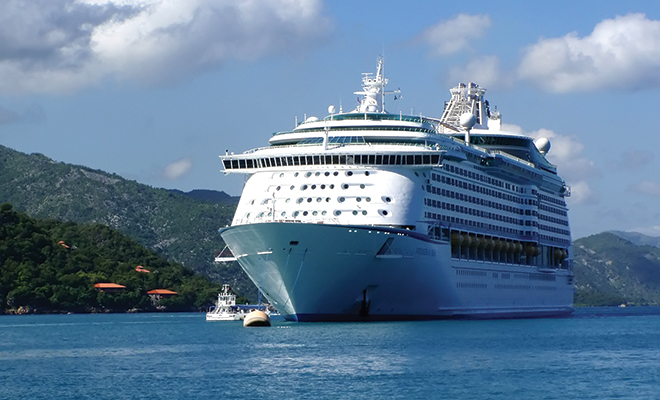
Living at Sea and Cruising the World!
Imagine waking up every morning to a different view, surrounded by the deep blue sea. It’s a dream shared by many. The cruise ship lifestyle is appealing to those who want to experience the world while living in comfort and luxury.
Many people spend much of their time on cruise ships, according to Condé Nast Traveler. They make it happen by booking back-to-back cruises or by purchasing an apartment on a residential cruise ship. Another option is an extended cruise, such as Holland America’s Grand World Voyage that spends several months circumnavigating the globe.
With hotel-quality accommodations, housekeeping, gourmet meals and professional entertainment, cruising provides the perfect retirement for many. While it’s true that most cruise ship residents are retirees, you’ll also find people who work remotely or manage businesses while exploring global destinations. Some of them live on The World, a private residence cruise ship with 165 apartments that travels to destinations chosen by residents. The MV Narrative, an even larger residential ship set to launch in 2024, promises “the luxury of a superyacht featuring a helipad and a marina with personal watercraft. Designed for living aboard and environmental sustainability.” About 1,000 lucky owners and renters will have access to amenities such as private kitchens, a farmer’s market, co-working spaces, medical services and 24-hour room service.
If this sounds like your fantasy, there are some things to consider before taking the plunge. For example, can you afford a permanent cruise ship lifestyle? What will you do about medical care? How will you stay in touch with family and friends back home? Before you seriously consider taking up cruise ship residence, it’s important to do your research and weigh the pros and cons.
It’s easy to imagine the benefits of life on a cruise ship. Your food is prepared for you, your household chores are taken care of, and resort-style entertainment venues are right on board. Besides enjoying luxurious amenities, cruising for extended periods offers the opportunity to visit multiple countries without the effort of taking multiple flights and unpacking your luggage in different hotels. As one full-time cruiser told CNN Travel, “Where else can you have your resort take you to different countries while relaxing by the pool or sleeping in a comfortable bed?”
At port, many long-term cruises offer shore excursions for free or at a reduced price. Of course, nothing is free since cruise lines factor excursions, entertainment and other amenities into the add-on charges for living onboard. CNBC recently reported on a 28-year-old tech worker who paid $300,000 for a one-year lease on a studio apartment on the Narrative, with around $2,100 in monthly charges for all-inclusive living fees. The short lease is unusual; most Narrative leases cost $1 million to $8 million and last for the life of the vessel. Let’s just say that for many retirees, full-time cruising isn’t financially possible.
Besides cruise fees, many people who live on cruise ships must pay to store most of their possessions or to have someone take care of their permanent home on land. Don’t expect to save money on taxes if you’re a U.S. resident. You’re still responsible for paying U.S. taxes on your income, including income from a 401(k), IRA or other taxable investment account.
Medical care is another consideration. Although most cruise ships have a doctor on board, passengers have reduced access to modern medical facilities in case of emergency. Also, most U.S. insurance plans do not cover healthcare at sea, so special cruise travel medical insurance is required. Anyone who has a serious medical condition or is at risk of developing one should consult with their doctor before deciding to live on a cruise ship.
Having an outgoing personality is a bonus when living far away from family and friends. Networking and socializing on board can help fight off the loneliness that often comes with long journeys at sea. Many long-term cruisers form friendships with fellow travelers and meet up year after year.
Living on a cruise ship can be an unforgettable experience, but it’s important to be realistic about the good as well as the bad. If you crave adventure but don’t want to sacrifice comfort and have the funds to pay for it, the cruising life may be the right choice for you.
If friendships and family relationships are a top priority, living on a cruise ship may not be the best option. Being at sea for months at a time can mean missing out on birthdays, weddings, graduations and other important events. Modern technology can help you stay in touch, but time zone differences and remote locations can make communication difficult while you’re at sea. ®
Sources: cntraveler.com, cnbc.com, cnntravel.com and cruisehive.com.







